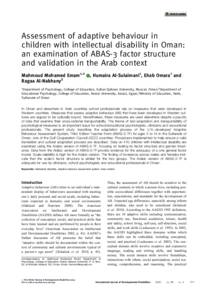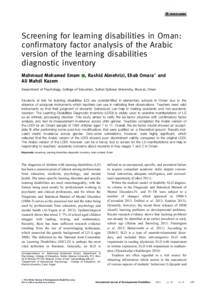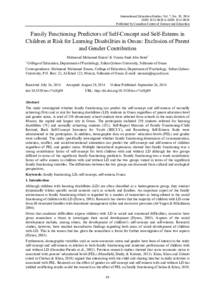وثيقة
Assessment of adaptive behaviour in children with intellectual disability in Oman : an examination of ABAS-3 factor structure and validation in the Arab context.
المعرف
DOI: 10.1080/20473869.2019.1587939
المصدر
International Journal of Developmental Disabilities. v. 66, 4, p. 317-326
المساهمون
الدولة
United Kingdom.
مكان النشر
Oxfordshire
الناشر
Taylor and Francis Ltd.
ميلادي
2020-08-01
اللغة
الأنجليزية
الموضوع
الملخص الإنجليزي
In Oman and elsewhere in Arab countries school professionals rely on measures that were developed in Western countries. Measures that assess adaptive behaviour (AB) that have been developed in Western cultures are argued to be culturally bound. Nevertheless, these measures are used elsewhere despite a paucity of data that examine their cross-national transportability. The theme of test adaptation and transportability of psychological measures is an important issue for school/educational psychologists, clinicians and educational professionals. The present study describes the adaptation process of the U.S.–developed Adaptive Behaviour Assessment System, Third Edition Teacher Form (ABAS-3-TF) for ages 5 to 14 in the Sultanate of Oman, one of the Gulf Cooperation Council (GCC) countries. Procedures implemented to help ensure a valid translation and cultural adaptation process are described. Data on 410 children with intellectual disability are examined using the Arabic version of ABAS-3-TF, focusing on testing its factor structure and gender invariance. Data from the Arabic version of ABAS-3-TF provide evidence for the adequacy of a one general factor model. Scale reliability is high for the Arabic version. The finding of invariance across males and females indicate that the scale’s factor structure is similar for the two groups. The Arabic version of ABAS-3-TF is adequate for use by clinicians, school psychologists and educational professionals in Oman.
ISSN
2047-3869
URL المصدر
قالب العنصر
مقالات الدوريات



